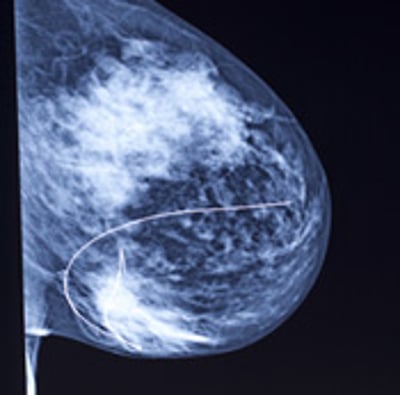FORCE's eXamining the Relevance of Articles for You (XRAY) program looks behind the headlines of cancer news to help you understand what the research means for you.
XRAY is a reliable source of hereditary cancer research-related news and information.
Learn more about the XRAY program
Categories Cancer Treatment
Relevance: Medium-Low


Strength of Science: Medium-High


Research Timeline: Lab Research


Study : Hot chili pepper component slows growth and kills laboratory-grown breast cancer cells
Relevance: Medium-Low


Strength of Science: Medium-High


Research Timeline: Lab Research


Most relevant for: This research is not relevant to people yet
Finding new treatments that target triple-negative breast cancer is an area of great interest. An early step in developing these treatments is learning more about the biology of tumor in the laboratory. This study looked at how capsaicin, the spicy component of chili peppers, might work with a protein found in many cancers, including triple-negative breast cancer, to stop cancer cell growth. This is the first step in a long process towards developing new treatments for triple-negative breast cancer. (2/14/17)
Read More
Study : “Chemobrain” seen in breast cancer patients up to six months after treatment
Most relevant for: People diagnosed with breast cancer who have or will be treated with chemotherapy
Many people report memory or concentration problems, commonly known as “chemobrain,” during and after cancer treatment. New research shows that for some breast cancer patients these issues continue 6 months after treatment. Documentation of this well-known effect is a crucial first step in developing ways to limit and treat it. (02/02/17)
Read More
Relevance: Medium-High


Strength of Science: Medium


Research Timeline: Human Research


Study : Does prior antidepressant use affect the treatment breast cancer patients receive?
Relevance: Medium-High


Strength of Science: Medium


Research Timeline: Human Research


Most relevant for: Women diagnosed with breast cancer who have received antidepressants
Previous research found an association between depression and survival in breast cancer patients, but the reasons for this association are unclear. Researchers in this study found that women who had been previously prescribed antidepressants were less likely to receive breast cancer treatment that followed national guidelines than those who had not. Although the difference was small, it underscores the need for patients to discuss any history of depression with their health care providers. (1/24/17)
Read More
Article : After mastectomy: reconstruct or not?
Most relevant for: Woman who are facing mastectomy
Today, more women know they can have breast reconstruction after removing their breasts for cancer treatment or risk reduction. But what about choosing not to undergo reconstruction? Roni Caryn Rabin writes about the experiences of women who decide against reconstruction in her New York Times piece “‘Going Flat’ After Breast Cancer.” (12/14/16)
Read More
Relevance: Medium


Quality of Writing: Medium-Low


Article : Headlines claim drug combination destroys tumor in 11 days—is this too good to be true?
Relevance: Medium


Quality of Writing: Medium-Low


Most relevant for: People with Her2-positive breast cancer
A recent IFLScience headline proclaimed "Remarkable Breast Cancer Trial Destroys Tumors in Just 11 Days." This sounds amazing but it leaves out key facts. First, the finding applies only to HER2-positive breast cancer, not all breast cancers. More importantly, the results are from a conference presentation and have not yet appeared in a peer-reviewed scientific journal. What does that mean for breast cancer patients? (12/6/16)
Read More
Study : Cancer treatment costs can vary widely
Most relevant for: People diagnosed with breast cancer
Healthcare providers cannot give their breast cancer patients information on chemotherapy treatment costs because not enough is known about the exact costs. New research finds that costs vary not only between different cancer treatments, but also between similar treatments, such as all treatments that target HER2+ breast cancer. (11/22/16)
Read More
Relevance: High


Quality of Writing: High


Article : Huffington Post article brings attention to metastatic breast cancer
Relevance: High


Quality of Writing: High


Most relevant for: People diagnosed with metastatic breast cancer
Barbara Jacoby's Huffington Post piece, "How do breast cancer and metastatic breast cancer differ?" emphasizes the need for more treatment options for patients with advanced breast cancer.
Read More
Relevance: Medium


Quality of Writing: High


Article : A cancer patient’s tumor is genetically profiled—how does that info help treatment?
Relevance: Medium


Quality of Writing: High


Most relevant for: People diagnosed with advanced cancer
Jessica Wapner's Scientific American article explores the difficulties of making the vast amount of information acquired from tumor gene tests useful to patients and physicians. (9/20/16). Update: THIS INFORMATION HAS BEEN UPDATED. In late 2017, the FDA approved two separate tumor profiling tests to help guide treatment choices. The FoundationOne CDx (F1CDx) genomic test has been approved to test for 15 different targeted therapies used to treat five types of cancer, including ovarian, colorectal, lung, breast and melanoma. The FDA also approved the MSK-IMPACT and developed for use by Memorial Sloan Kettering Cancer Center (MSKCC) to scan tumor samples for 468 different cancer-associated mutations or alterations.
Read More
Study : How beneficial is online communication after a new diagnosis of breast cancer?
Most relevant for:
Newly diagnosed breast cancer patients often use online communication to find more information about their diagnoses and treatment options. But does online communication benefit these patients' decision-making process? (8/30/16)
Read More
Relevance: Medium-High


Strength of Science: High


Research Timeline: Post Approval


Study : Extending aromatase inhibitor duration to 10 years lowers recurrence for ER/PR+ breast cancer patients
Relevance: Medium-High


Strength of Science: High


Research Timeline: Post Approval


Most relevant for:
Hormonal therapy reduces the risk of recurrence for women with early-stage breast cancer that is ER-and/or PR-positive. Standard therapy lasts 5 years. A new study looks at whether extending one type of hormonal therapy, known as aromatase inhibitor therapy, to 10 years lowers recurrence rates even more for these women. (7/26/16)
Read More